| Srl | Item |
| 1 |
ID:
120176
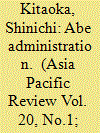

|
|
|
|
|
| Publication |
2013.
|
| Summary/Abstract |
The second Abe administration, inaugurated on December 26, 2012, has been called a repudiation of the Democratic Party of Japan (DPJ) rather than a strong endorsement of the Liberal Democratic Party (LDP). However, in the intervening months, public support has risen. Going forward, the Abe administration faces three serious challenges, namely the economy, security and foreign policy, and a strategy to win in the Upper House elections expected in July 2013. This article analyzes each of these challenges and explores possible courses that the administration could take.
|
|
|
|
|
|
|
|
|
|
|
|
|
|
|
|
| 2 |
ID:
080909


|
|
|
|
|
| Publication |
2008.
|
| Summary/Abstract |
Neorealists argue that Japan's response to the rise of China has been to draw closer to the United States in order to balance Chinese power. In practice, the Koizumi and Abe administrations differed in their responses to the growth of Chinese power in East Asia. While Prime Minister Koizumi sought to consolidate the US-Japan alliance, Prime Minister Abe adopted a dual-track approach, combining enhanced bilateralism with enhanced regionalism. Although buttressing the US-Japan alliance, this strategy aimed to balance China by building a containment coalition with other Asia-Pacific states. Japan's signing of a security declaration with Australia in March 2007 was an important element of Abe's strategy, and marked a subtle shift in Japanese security policy from exclusive bilateralism to modest minilateralism. Although congruent with US strategic interests, this move supported Prime Minister Abe's ambition to exercise more autonomous influence over the regional security order
|
|
|
|
|
|
|
|
|
|
|
|
|
|
|
|
| 3 |
ID:
156328
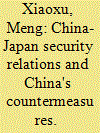

|
|
|
|
|
| Summary/Abstract |
Since the nationalization of the Diaoyu Islands by Japan in 2012, mutual trust between China and Japan has been declining, and bilateral security relations have reached a low point. In the near future, China-Japan security relations will face more challenges than opportunities. China should make measures to impose necessary pressure on Japan and to strengthen interpersonal communication and understanding between people of the two countries.
|
|
|
|
|
|
|
|
|
|
|
|
|
|
|
|
| 4 |
ID:
179532
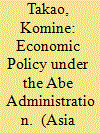

|
|
|
|
|
| Summary/Abstract |
This article focuses on the economic policies under the Shinzo Abe administration in office from December 2012 until September 2020. The economic policies under the Abe administration are generally referred to as “Abenomics.” There are several possible definitions of “Abenomics,” but for the purposes of this paper, we will take the broadest definition and refer to the entire range of economic policies that were implemented under the Abe administration.
|
|
|
|
|
|
|
|
|
|
|
|
|
|
|
|
| 5 |
ID:
173182


|
|
|
|
|
| Summary/Abstract |
This article examines Japan’s trade policy on significant geo-economic developments by focusing on its engagement in three large free trade agreements: the Trans-Pacific Partnership, the Regional Comprehensive Economic Partnership, and the Japan–EU Economic Partnership Agreement. Under the Abe administration, Japan has produced successful outcomes in mega-FTA strategy, concluding the Comprehensive and Progressive Agreement for Trans-Pacific Partnership and the Japan–EU Economic Partnership Agreement in 2018. The making and diffusion of high-standard rules were given high priority in Japan’s mega-FTA strategy, and Prime Minister Abe’s political leadership in employing his political allies and executive aides and managing the opposition activities of veto players has enabled his administration to produce these successful outcomes.
|
|
|
|
|
|
|
|
|
|
|
|
|
|
|
|
| 6 |
ID:
142984
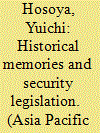

|
|
|
|
|
| Summary/Abstract |
In Japan, two political issues came to the forefront in the year marking the 70th anniversary of the end of World War II. While usually dealt with separately, the Statement by Prime Minister Shinzo Abe, issued on August 14, 2015, and the security legislation based on the concept of a “Proactive Contribution to Peace” both relate to the question of how we view Japan's place in international society. This article examines how both these issues support Japan's commitment to maintaining its identity as a peace-loving nation and its responsibility to contribute to international peace and prosperity.
|
|
|
|
|
|
|
|
|
|
|
|
|
|
|
|
| 7 |
ID:
158770
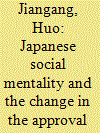

|
|
|
| 8 |
ID:
133836
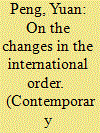

|
|
|
|
|
| Publication |
2014.
|
| Summary/Abstract |
A debate on the controversial issue of the international order has been the vogue in current times. To China high on the agenda in the defence of the post-war international order, as the Abe administration denies Tokyo's past aggression by paying homage to the Yasukuni shrines (where ashes of 14 class-A war criminals are honored), and appears to be reinterpreting its pacifist constitution in a bid to lift the ban on collective defence.
|
|
|
|
|
|
|
|
|
|
|
|
|
|
|
|